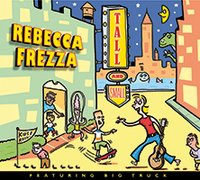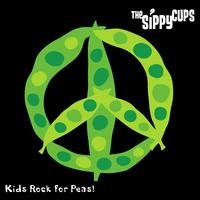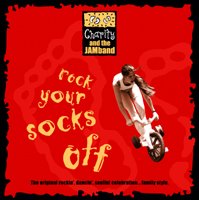I didn't start playing guitar seriously till I was 16... I remember bringing my guitar out to the living room and playing it for my mom. She said "That's great, but why do you stick your tongue out when you play?" Now I notice that my son sticks his tongue out when he's concentrating.One of the more unexpected discoveries for me thus far this year was the self-titled debut album by the Los Angeles-based band
The Hollow Trees. Inspired by Dan Zanes' recordings and released in late 2005, the album contains
spirited renditions of folk songs and other kid-friendly tunes. Greg McIlvaine, guitarist and Hollow Trees co-founder, took time out to answer some questions. Looking for some kids' music recommendations you probably
haven't heard before? Then check out the end of the interview.
And thanks to Greg for his time.
************************
What music did you listen to growing up?I don't remember any kid's music to speak of. I had one of those Fisher Price mechanical record players with the thick colored discs that I played with a lot.
My first musical memory is of a honky tonk band playing during the day at a bar on the beach. The only thing I remember about that was the bass line, the fifths which are traditional in country and polka music. I still love that bass line. Later I remember listening to the Dr. Demento show and thinking that it was the greatest thing ever.
My parents don't play instruments, but my dad is into music and was always buying records and new hi-fi equipment. Once I became more interested in music I began checking out his collection. He had a few records that I really attached myself to - a Josh White record, a Hoyt Axton record from when he was a folk blues singer, a Jimmy Reed record, Muddy Waters at Newport, a Johnny Cash record, an acoustic blues record called
Down South Summit Meeting with Lightning Hopkins, Brownie McGee, and Sonny Terry jamming.
Eventually I discovered rockabilly through the Stray Cats and oldies like Elvis and Little Richard. There was a scene in LA which I knew through KROQ, and my favorite band - still to this day - is The Blasters. My dad took me to my first concert at the Country Club in Reseda - The Blasters with the then unsigned Los Lobos opening up. Awesome.
Any particular Dr. Demento favorites?I really remember thinking that "Shaving Creme" was funny. Also "Existensial Blues" and "Fish Heads."
Did you grow up singing and playing the traditional songs you've recorded on the debut?Not really. I didn't start playing guitar seriously till I was 16. The first song I learned was "Jailhouse Rock" by Elvis. I remember bringing my guitar out to the living room and playing it for my mom. She said "That's great, but why do you stick your tongue out when you play?" Now I notice that my son sticks his tongue out when he's concentrating. I played some folk and country but early on I was more interested in blues, rockabilly and punk.
In college I hosted hootenannies every Sunday for about three years. It wasn't a jam, instead we'd pass one guitar around and people would play their new songs or old hits. I would play "On Top of Spaghetti" and "It's a Small World" for laughs, but now that seems like foreshadowing.
Later I got more in to country music and decided to create myself a repertoire. I began learning lots of standard country songs, moving back in time from Willie Nelson to Hank Williams to Jimmie Rodgers. Eventually that path led me to ballad singers and that was around when The Hollow Trees started.
How did you select those songs (i.e., were they your favorites, your son's favorites, ...)?In general we try to find great songs which are not as well known so we don't have to rely too much on the songs everyone has heard a million times. We've learned a few of them because they're good for sing-alongs when you're playing live, but I didn't see any reason to record them. The exceptions are "Polly Wolly Doodle" which is one of our signature songs, and "Shoo Fly" which was my son's favorite song for awhile.
I should also mention here that Laura [Steenberge, the band's bassist and co-founder] is an extremely accomplished musician and she really helps with choosing the material and working up the arrangements. We try to pick songs that we really like and have fun playing, and figure that our joy will be passed on to the kids and parents in the audience.
Where did you record the album? It has a very intimate feel and sounds like it could've been recorded in your living room.Pretty close! It was recorded at home in my office using Adobe Audition software on my PC. I have been doing home recordings since high school, starting with a 4-track, then graduating to a digital 8-track, and now the computer. There's nothing fancy as far as equipment, but the computer does give you a lot of options. Some songs are live, some all overdubs, and some a mix. I try to keep it simple and remember Ray Charles' advice: If it sounds good it is good.
Exactly how many people are singing on the rollicking "Jack Was Every Inch a Sailor"?I think there's 11 people, but at least 2 tracks of each of them. Laura and I sang on it, and my buddy Matt Welch who sings on several tracks on the record. Then on a couple occasions when we had friends over I would have everyone come upstairs to sing on it. I don't have enough sets of cans (that's what musicians call headphones) for everyone, so I would put one set on myself and play my guitar and kind of conduct everyone. It made for a loose feel which came out nice, especially with my son and his buddy on there.
Which songs are your favorites to play? Which songs draw the most response in concert?That's a hard one because I really like playing all the songs. We open our shows with "Polly Wolly Doodle." It's a magical song which always makes you a little happier than you were before. "Bunny Hop" is fun because we have the kids come up with different animal sounds. Sometimes they'll say giraffe and we'll have to ask them what a giraffe sounds like. Laura and I switch instruments for "Everybody Has Hands" and that's a big favorite.
Did you have fun writing the originals on the debut, or were those difficult to do?These particular songs all came pretty easily. "Nelson" and "Forest Melody" describe The Hollow Trees' universe. "Bunny Hop" came from the idea of combining a dance song with an animal sounds song - the perfect storm of children's music!
You mention Dan Zanes as an inspiration for the group; who else recording kids and/or family music inspired you?Like Dan Zanes I mostly look to older music for material and inspiration. The first kids' music I bought, when my wife was still pregnant, was a used copy of Burl Ives' out of print CD "Chim Chim Cheree and Other Favorites." I thought it was awesome and Burl's voice made every day seem like Christmas. I began getting more of his music and I love it, the old folk ballads especially. "Lavender Cowboy" is a song I learned from one of his non-kid records. For any serious kids' music fan with a record player I would recommend his album called "Animal Folk" on Disney's Buena Vista Records. It's a gatefold with a book of lyrics and illustrations inside. We've learned almost every song on there, including "The Black and White Pigeon" and many others which we haven't recorded.
Besides Burl I like other 60's folk singers like Ed McCurdy, Oscar Brand, Richard Dyer-Bennett, Ella Jenkins, all of the various Seegers. Tom T. Hall's "Country Songs for Children" is a big favorite too. Yazoo Records has a bunch of great compilations of really old recordings, and there's two volumes aimed at children called
The Story that the Crow Told Me which are a lot of fun if you like that real old-time music.
What's next for the Hollow Trees and the album?My wife and I are expecting our second child any day now so we're taking a bit of a break on playing live shows, but we'll be back playing in a couple months. We have quite a few new tunes ready so we'll record again soon. The CD is getting around by word-of-mouth and through great reviews like yours, so it's exciting to watch that. We're having a great time and look forward to more fun musical adventures in the future.
Do you think you'll change the mix to record more original tunes, or do you like the mix of mostly older material with a handful of new tunes?It will probably be the same kind of mix, depending on the original material we have and how the recordings come out.
 With her third studio album, Tall and Small (2006), set to be released next week, Rebecca Frezza and her band Big Truck make a bid for kids' music stardom. The New Jersey-based singer/songwriter has had videos on Noggin, but this album seems one of those CDs designed to attract even wider attention.
With her third studio album, Tall and Small (2006), set to be released next week, Rebecca Frezza and her band Big Truck make a bid for kids' music stardom. The New Jersey-based singer/songwriter has had videos on Noggin, but this album seems one of those CDs designed to attract even wider attention.





